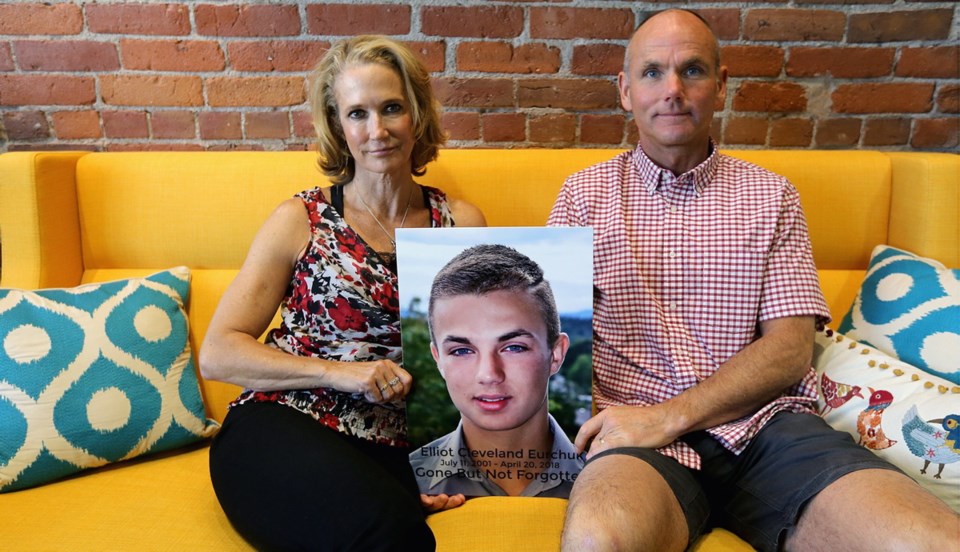An Oak Bay mother says if B.C. can sue drug companies to recoup the health-care costs of the opioid crisis, it can find answers and legislate change following her son’s opioid overdose death.
“I do think it’s a step in the right direction,” said Rachel Staples, whose 16-year-old son, Elliot Eurchuk, died of an illicit drug overdose in April.
“But government is trying to use a blanket approach, and this is a multi-faceted problem,” Staples said.
“I think they need to acknowledge there’s a lot more work to be done and it’s not just [about] holding these drug companies accountable and financially responsible.”
Elliot underwent four surgeries, had a blood infection, and was prescribed Dilauded and fentanyl. His parents say he developed an opiate dependency as a result.
Because Elliot was considered competent under the B.C. Infants Act, he was able to consent to his own care and his parents were not able to access information about his medical records or possible illicit drug use, or prevent him from being prescribed opioids.
Staples and husband Brock Eurchuk want the B.C. government to update the Infants Act or adopt the B.C. Liberals’ Secure Care Act, which would allow for the involuntary short-term placement of youth in a facility to address mental-health challenges and substance abuse.
They also want a coroner’s inquest into Elliot’s death to prevent “dangerous practices and circumstances” from robbing another young life.
“I guess one question I have is if the government can issue a lawsuit over these pharmaceutical companies, why can’t they grant us the chief coroner’s inquest into Elliot’s death?” Staples said.
“Drug companies are just one part of the problem.”
British Columbia’s proposed class-action lawsuit targets dozens of pharmaceutical companies, alleging they falsely marketed opioids as less addictive than other pain drugs and helped trigger an overdose crisis that has killed thousands, including 1,399 people in B.C. last year.
Staples, a dentist, remembers drug marketers trying to ply her profession in the 1990s with “incentives” such as free cruises and cash for using their opioid products. And while that practice wasn’t condoned, she said, the mindset among doctors remained that the drugs were safe to prevent pain and pain was to be avoided.
Dr. Eric Cadesky, president of Doctors of B.C., said pain is complex, but what doctors were told about opioids two decades ago is starkly different from what they are told today. Now, the general recommendation is to reduce doses and duration where appropriate.
The idea is to review patient histories and personalize a plan when prescribing of opioids, Caedesky said. Opioids might be the wrong choice for some patients, but for others — including some who have been taking them safely for decades for chronic pain — close monitoring by a physician is the answer.
Staples said she said she was pleased to see some changes at Victoria General Hospital recently.
Elliot’s younger brother Oliver had emergency surgery May 31 to repair a hip he fractured in a skateboarding accident.
The anesthetist told Staples he had just returned from a European symposium that recommended doctors use fractional doses of opioids and blocking agents to block the pleasure centres in the brain that opioids stimulate.
“Oliver had nothing more than two Tylenol post major surgery — hip surgery,” said Staples, who notes that pain is a normal part of healing. “And he didn’t complain once. He was well managed with Tylenol.”
— With files from The Canadian Press



